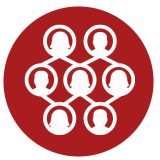Previous gender projects, quantitative and qualitative assessments of the situation for the purposes of the PLOTINA project showed low awareness on gender research and gender equality practice, especially among researchers.
Creating a network structure with the aim to facilitate and maintain communication and cooperation between actors in the areas of gender research and gender equality practice
Problem (evidence)
Aims/objectives
To boost awareness of gender sensitive research and gender equality practices in different levels and fields. In the long term, we assume more knowledge gained about gender equality will translate into identifying further inequalities, which will in turn spur more action.
Resources
Mostly human resources.
Communication skills for the preparation of news and to make invitations more appealing.
All activities carried out were financed by the remaining projects or their stakeholders.
Brief outcomes
We have created a list of stakeholders (organizations, ministries, research institutions) interested in gender equality and we collaborate with them sharing good practices and challenges. These contacts have proven useful when trying to find a certain expert (i.e. discrimination in employment in PROs).
We have also been contacted by other Slovenian organizations implementing gender projects and have organized a joint event with STARBIOS2 project (Round table: Science or family? Do we really have to make a choice?, on 8th of March 2019, Number of people attending: >50 people ).
We have also become a member of Communities of Practice within ACTon Gender project (dealing with Slovenia and Life Sciences). As part of this we co-organised an event (Sex and Gender inclusion in research , on 5th of March 2019, Number of people attending:<10).
Key area
The governance bodies, key actors and decision-makers
Type of action
Creation of structures
Organization
Kemijski Inštitut, National Institute of Chemistry
Research institute
Action level of implementation
Researchers/professors and technical and administrative staff
Implementation
The PLOTINA project team embarked on the creation of the network at the start of the project. A contact list of the people interested in this topic was expanded at every opportunity. We sent the news through this mailing list and invited potential people and organizations to common actions and collaborations. For each event, the list was tailored to the content of the event and stakeholder. In 2019, we joined forces with two projects working on gender equality in research: STARBIOS2, a H2020 project implemented by University of Primorska. We held a joint round table at NIC on March 8 and are exchanging newsletters and interesting events. The second project is ACTonGender, where NIC has become a member of two communities of practice: one dealing with the situation of female researchers in Slovenia, which will be extended to other republics of former Yugoslavia, and the other dealing with Sex and Gender dimensions in life sciences. A formal list of groups was compiled based on contacts within other projects.
Challenges
There was not much interest in this kind of information, events and actions. Interest levels were very low at the beginning; even with the focused effort of PLOTINA, engaging more and different people remained an obstacle. Due to the fact that staff members receive a lot of internal e-mails, it was hard to persuade them to include gender issues as a priority.
The amount of human resources required was bigger than initially expected.
Coping strategies
To raise interest on the topic we stressed the positive outcomes of gender equality plans/actions for staff members and pointed out that research funding will become increasingly dependent on the “gender factor”.
With NIC staff members, we participated in meetings, informal gatherings, courses etc. to engage with researchers applying for EU funding.
To promote the events and our GEP we handed out flyers in the communal spaces of NIC.
We participated in joint events (conferences, seminars, lectures) and shared our experience about the implementation of GEPs at NIC, including best practices and lessons learnt.
More detailed Outcomes/Impact
Sharing of know-how (implementation of actions, important in small community like Slovenia).
Positioning of the Institute as a key player in the field.
Reflection: what we would do differently
It would be useful to plan in advance and send reminders to interested contacts. We need to be more creative when sending out invitations to attract attention. It is important to check other events in the field and avoid repetition.
Unintended consequences
Many people came to the event to support the efforts of respected colleagues. While this is flattering, it does not really ensure any sustainability.


